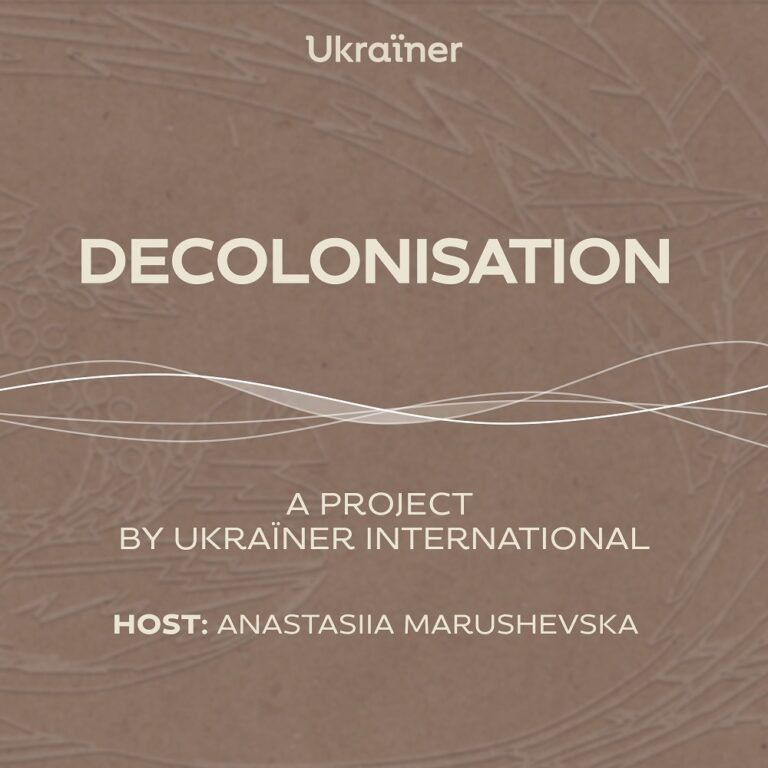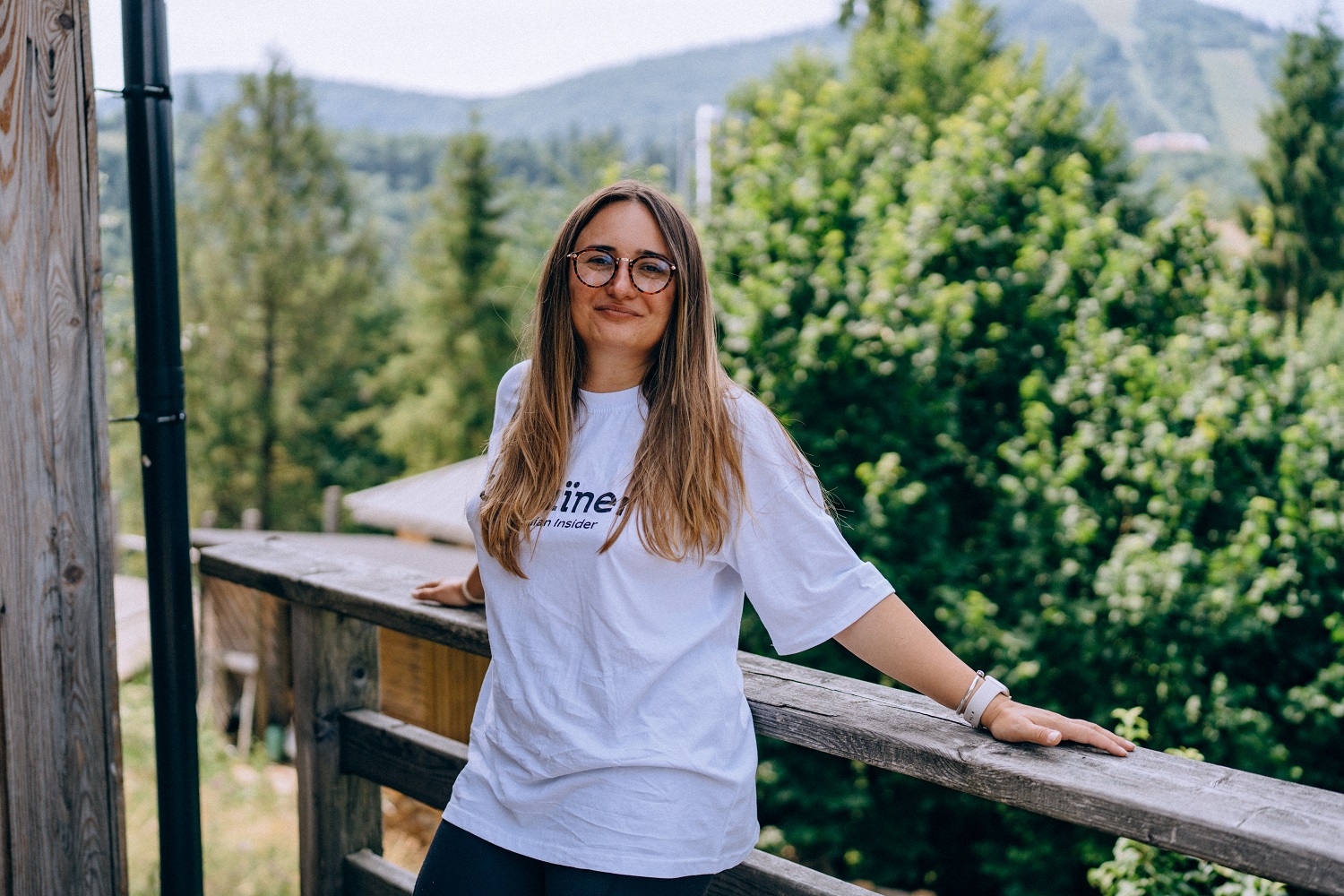
Every Eastern and Central European, regardless of where they are in the world, has at some point been called Russian. For a long time, this was dismissed as mere stereotypes, but in reality, the world has viewed us through a foggy lens, seeing something ambiguous beginning just beyond the Berlin Wall. The Berlin Wall fell, countries fought against communism and dictatorships, endured wars, and rebuilt their identities from ashes. However, the foggy lens remained.
Decolonisation is a series of podcasts in which we explore how these distorted perceptions can be improved and why countering Russian imperial influence is crucial for the future of global democracy. In this series, we speak with international experts in culture, history, politics, language, collective memory, and information to deconstruct the prevalent Russian narrative and examine what modern Europe is truly about.
Follow Ukraїner in English, Polish, and Czech to listen to our conversations in different languages.
Decolonisation in the context of Ukraine, Eastern and Central Europe
The Russian empire, in its various forms — from the time of Muscovy to the USSR and Putin’s Russia — has created artificial narratives that are still difficult to deconstruct. These narratives persist because the educational, academic, and intellectual frameworks are often built upon them and remain prevalent worldwide. Each time someone argues that it is acceptable to say “the Ukraine” or fails to recognise the issue of referring to Ukrainian artists and writers as Russian, they erase the existence of millions of Ukrainians who have fought and died over centuries for the right of Ukraine to exist and to uphold its authentic identity. Ukrainians continued to fight for this right in the east of Ukraine and Crimea in 2014 and are now fiercely defending it against Russian imperialism.
In Central and Eastern Europe, the decolonisation process is similar, even though it began earlier once the communist regimes lost their grip on power. This process involved a complex interplay of national awakening and resistance against various forms of imperial control, primarily Soviet but also earlier influences. Nations such as Poland and Czech Republic, experienced a rebirth of national identity that communist regimes tried to suppress. Following the collapse of the USSR and other communist regimes under the Soviet umbrella, these nations quickly moved to reclaim their history, language, and cultural symbols that had been marginalised or altered to fit the imperial narrative.
We have chosen to discuss the decolonisation processes of Ukraine, as well as Eastern and Central Europe, because this is a crucial topic that needs global understanding. The oppression from Russia, often overlooked, still looms as it remains the largest existing empire. Currently, the fight for decolonisation is vividly present on the frontlines of Ukraine, where not only land but the very idea of democracy is being defended. It’s time for the world to recognise and eliminate Russian imperial influence for the sake of a better future, marked with a better understanding of our histories and identities.
Ukrainer in English X Spaces and podcast series: Decolonisation episodes
The podcast is created by the Ukraїner International team and is available live on Ukraїner in English X (Twitter) page, as well as in podcasts episodes on Spotify, Youtube, and Apple Podcasts. The host of the English-language podcast is Anastasiia Marushevska, a journalist, expert in global communications, Editor-in-Chief of Ukraїner International, and co-founder of the NGO PR Army.

Anastasiia Marushevska, photo by Sofiia Soliar.
#1 How populism works and exploits post-colonial sentiments, with Catherine Fieschi
Listen on Apple Podcasts
Listen on Spotify
Listen on YouTube
The guest of the first episode of the Decolonisation series is Catherine Fieschi, a political scientist and one of the world’s leading experts on populism, also known as the author of the bestselling book Populocracy: The Tyranny of Authenticity and the Rise of Populism. In this episode, Catherine and Anastasiia Marushevska focus on populism in Europe, delving into both the left and right sides of the political spectrum.
The episode explores the rhetoric of French populists Jean-Marie Le Pen, Marine Le Pen, and Jean-Luc Mélenchon, examining why their narratives echo those of Russia, and how antisemitism plays a key role in their political agendas. Anastasiia and Catherine also discuss whether populism can be considered an ideology, how it exploits post-colonial sentiments, and why Ukraine’s resistance to Russian aggression has become a focal point in populist narratives around the world.
#2 Historical context of Russia’s war against Ukraine with Jade McGlynn
Listen on Apple Podcasts
Listen on Spotify
Listen on YouTube
The guest of the second episode of the Decolonisation series is Jade McGlynn, a leading British expert on Russia, memory politics, history and identity construction. As a researcher at King’s College London, Jade is also known as the author of books Russia’s War and Memory Makers: The Politics of the Past in Putin’s Russia. In this episode, Jade and Anastasiia Marushevska explore how Russia weaponises memory politics and the role that the Russian historical myths play in its ongoing invasion of Ukraine.
This episode delves into how Vladimir Putin’s historical distortions echo Soviet methods, why the Russian colonial narratives dominate Western academia, and why Russia’s decolonisation is unattainable without further decolonising Europe.
#3 Bernard-Henri Lévy on decolonisation and struggle for democracy
Listen on Apple Podcasts
Listen on Spotify
Listen on YouTube
The guest of the third episode of the Decolonisation series is Bernard-Henri Lévy, a prominent French philosopher and public intellectual, also known as BHL. Throughout his long career, he has reported on some of the world’s most impactful wars, including those in Bosnia, Afghanistan, Iraq, and Ukraine, as reflected in his numerous books, such as The Empire and the Five Kings and Israel Alone. In this episode, Bernard Lévy and Anastasiia Marushevska discuss how decolonisation is related to the ongoing struggle between democratic and authoritarian regimes around the world.
The episode uncovers how the war in Afghanistan set the stage for the Russian invasion of Ukraine, why Ukraine and Israel are facing criticism from far-left populists, and how Russia, Turkey, China, and Iran are shaping a new global anti-democratic axis.
#4 Timothy Garton Ash on Europe’s shared identity and reshaping the perceptions of Ukraine
Listen on Apple Podcasts
Listen on Spotify
Listen on YouTube
The guest of the fourth episode of the Decolonisation series is Timothy Garton Ash, a renowned British historian, author, and commentator celebrated for his in-depth analysis of modern European history, particularly concerning Central and Eastern Europe. In this episode, Timothy Garton Ash and Anastasiia Marushevska discuss the shift in Europe’s identity as it is perceived in Western academia and by the general public.
In this episode, Prof. Ash reveals an inclusive model of European history, explores the concept of intra-European orientalism, and highlights what distinguishes the decolonisation of Ukraine’s perceptions from those of other nations in the region.
#5 Uilleam Blacker on colonial legacies and decolonisation of Ukrainian literature
Listen on Apple Podcasts
Listen on Spotify
Listen on YouTube
The guest of the fifth episode of the Decolonisation series is Dr Uilleam Blacker, a scholar of Ukrainian and East European culture and one of the prominent translators of Ukrainian literature into English. In this episode, Dr Blacker and Anastasiia Marushevska explore how the multi-layered colonial influence has been reflected in Ukrainian literature throughout history.
In this episode, Dr Blacker explains how colonial influence compelled Ukrainian authors to navigate multiple identities, highlights profound parallels between Walter Scott and Mykola Hohol (globally known as Nikolai Gogol), and uncovers the mechanisms Russian colonialism used to erase Ukrainian authors from the global stage.
#6 Understanding the Holodomor and Ukraine’s erased identity, with Daria Mattingly
Listen on Apple Podcasts
Listen on Spotify
Listen on YouTube
The guest of the sixth episode of Decolonisation is Daria Mattingly, an Affiliated Lecturer at the University of Cambridge and a lecturer in European History at the University of Chichester. As an expert on the social and cultural history of the USSR, with a particular focus on the 1932–33 Holodomor famine in Ukraine, Daria has also contributed to Anne Applebaum’s Red Famine. In this episode, Dr Mattingly and Anastasiia Marushevska, editor-in-chief at Ukraїner International and co-founder of PR Army, discuss the role of the Holodomor within the broader context of Russian colonialism.
In this episode, Dr Mattingly explains why all famines in the 20th century were necessarily man-made, how the Holodomor stripped Ukrainians of their heirlooms, and what signs point to its genocidal nature.
#7 Taras Kuzio on decolonising perceptions of Ukraine in academia
Listen on Apple Podcasts
Listen on Spotify
Listen on YouTube
The guest of the seventh episode of Decolonisation is Taras Kuzio, a renowned British-Canadian political scientist, analyst, and expert on Ukraine. In this episode, Dr Kuzio joins Anastasiia Marushevska, editor-in-chief of Ukraїner International and co-founder of PR Army, to discuss the challenges of decolonising perceptions of Ukraine in Western academia, particularly in light of the dominance of Russianists in post-Soviet studies.
Dr Kuzio explores why Ukraine remained a blind spot in international academia until the full-scale invasion, why the traditional concept of the “post-Soviet” space is outdated, and how academic biases continue to influence Western policy-making on Ukraine.
New episodes coming soon.

